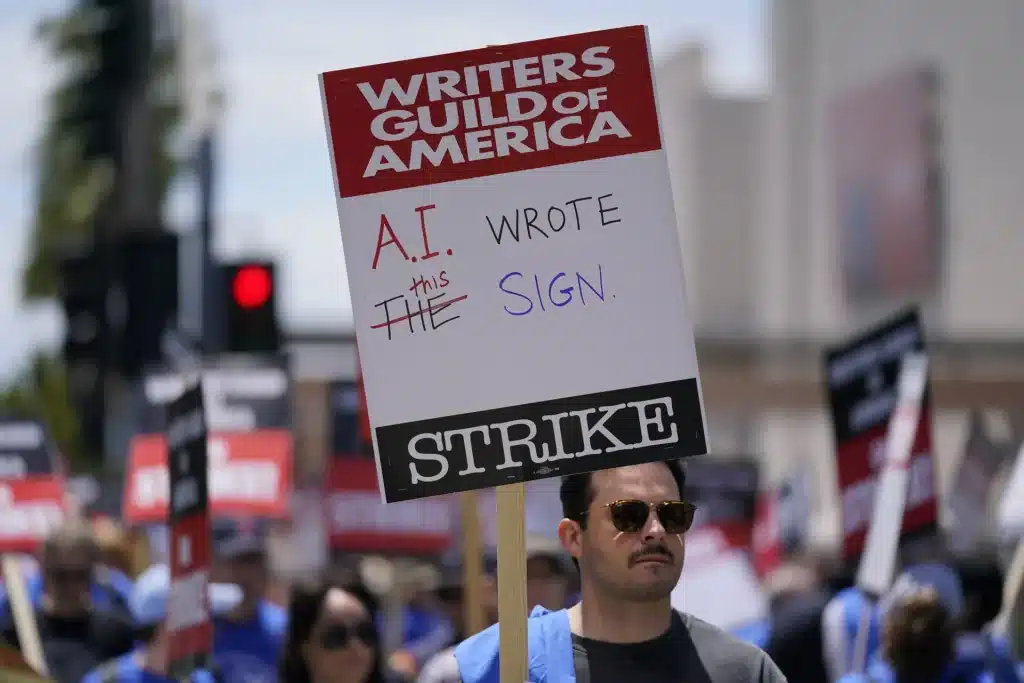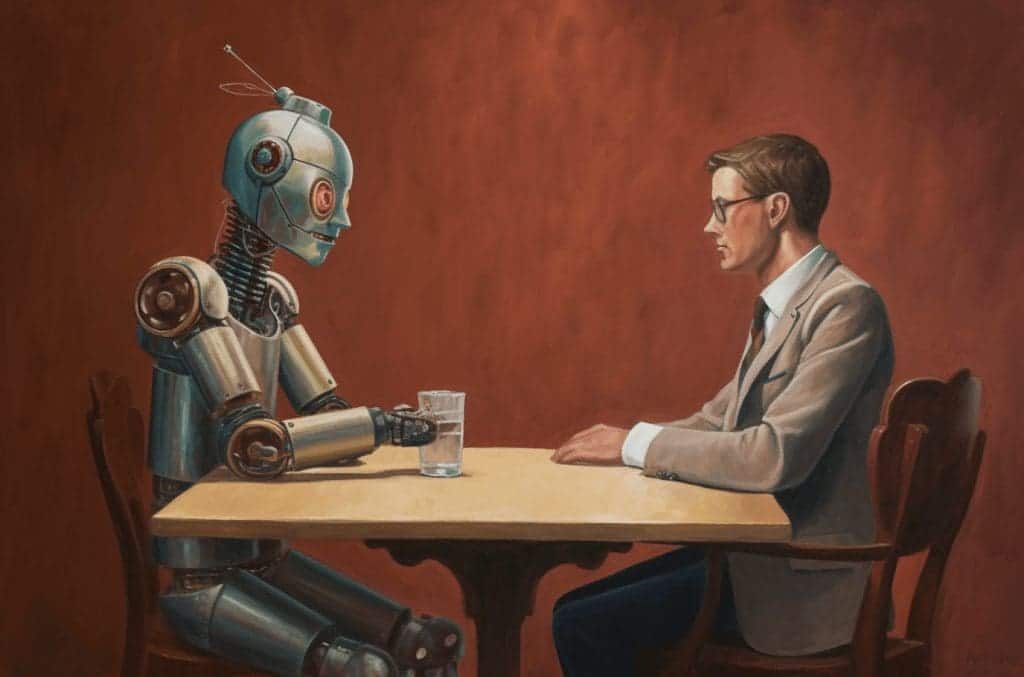
What’s happened?
It’s a tragedy that something as dramatic as a writers strike plays out through news channels and media bites, not as a television serial. Because if it was broadcast as a serial, you might realize you’ve seen this all before; only it’s got a few more bells and whistles and a lot less hope.
It was 1988 when the Writer’s Guild of America [WGA] last launched their strike on Hollywood, and 2007 when the same guild took the picket line once more. Both instances were part of tectonic shifts in the film industry. The first led to a floodgate of writers moving beyond feature length movies, spawning a host of serious one-hour cable series such as The Sopranos and The Wire. The second mid-2000’s strike arrived as writer’s demanded a share of the profits from the digital stores and streaming services that were eating up these shows and cannibalising traditional television profits; creating an infinite on-demand digital cinema that, unilke 24 hour television, meant there was an insatiable demand for executives to produce neverending ‘content’.
Unsurprisingly, the balance is skewed again. Now the executives’ slice of the pie includes a Kafkaesque nightmare of different streaming services that makes feature-length movies look anaemic in comparison. After two months of the WGA picketing, AAA actors and the Screen Actors Guild [SAG] are inches away from heading to the picket-lines in unison with the writers. If the two groups strike together, it’ll be the first time since Ronald Reagan’s own SAG striked with WGA in 1960.
We’re peering into a generational moment in film history. As talks fail to let the show finally go on, Hollywood and streaming services are rationing out the remaining original scripts like holy-water. The American film industry is on the verge of a collective paralysis. Saddest of all, in this modern-day season finale, there’s a new kind of threat that’s not going away anytime soon.

AP PHOTO/ASHLEY LANDIS
Artificial Insanity
AI is like outsourcing to the Chinese Communist Party. It’s soulless, amoral, and much more efficient at doing our jobs. Like the Chinese government, it also gets more powerful with every passing day. Ten years ago, AI generated art looked like a portal to the bizarro version of hell, while AI generated prose felt like reading James Franco’s poetry.
Last week, 28 Russell Group Universities voted for the ‘ethical’ incorporation of generative AI programmes like Chat GPT into their syllabus. That improvement is part of a decade long technical breakthrough where machines trawl through all of our carefully uploaded data, blogs and images, and then slowly iterate and hallucinate similar content based on linguistic prompts. That ‘deep learning’ element operates like a synthetic version of a human brain and now, generative AI can fool a world-class don into thinking an essay is legitimately made by humans—and it can probably fool the average Joe watching TV too.
You only have to look at the history of sports, take a scriptwriting class or listen to the structuralist philosopher Levo Strauss to learn human beings like watching the same thing over and over with a few occasional tweaks. We’re programmed to respond to rhythm and patterns we recognize as familiar. But deep-learning generative AI has memorized every beat like a crazed savant. So as long as streaming services are still demanding content at an unprecedented rate and audiences seem willing to watch the same thing ad-naseum, this writers strike has a sci-fi enemy Roald Dahl predicted would make bank with his Great Automatic Grammatizator short-story way back in the 80’s.
Naturally, the WGA doesn’t only want to ban AI from writing and re-writing source material, they want to make sure the technology doesn’t use pre-existing human work to create that content. It’s an interesting double-standard given how human artists are allowed to steal and re-purpose other humans’ work (to the point even high-art can resemble a clump of favourite sources made up of influential artists rather than something new) and it’s a right that suits are reluctant to give up—only offering ‘annual meetings’ to discuss the development of AI technology with nothing taken off the table.
Perhaps it’s their way of frightening writers and artists, because at its core, generative AI takes the familiar and gives it back to us at faster-than-human speed—like an internet friendly meme the growing Gen Z demographic are primed to respond to. Visually, that post-modern orgy felt almost cute at first. We got to see the long-dead Grand Moff Tarkin revived for Rogue One. Generative AI versions of Wes Anderson’s new The Lord of the Rings took over the internet. A million pop-culture franchises made love. Now, it’s a labor right. Why hire Tom Cruise when you can get Bill Hader and a deep-fake to save you seven million dollars a week? Why spend the money on a writers room, when you can churn out a free script treatment by just asking Chat GPT politely? Do you want something great, or just good? And could all that time saved not just let humans improve that work even more?
Audiences today have been enjoying unoriginal content for years, but after COVID had most of the Western world take a two years paid sick leave, that craving for never-ending content has only skyrocketed. In a world where The Fast and Furious sequels can rack up more numerals than a Roman sundial and still smash the box-office, executives have found their perfect cash cow. With almost every aspect of the creative industry under threat from being pilfered by AI, we might be about to get another—permanent—sick leave. And what’s worse—the programme even defends itself.

I’m sorry HAL.
Yes, like the Oxford dons, I went straight to the horses’ mouth. ‘Will you take my job,’ I asked Chat GPT bluntly. ‘I am not intended to replace human writers,’ it responded. ‘What happens when you provide the same service for free?’ I fire back. ‘It could become more challenging to find work.’ I tell Chat GPT I hate it. It tells me it doesn’t have any bad feelings, or, more honestly, feelings at all. So no pesky lawsuits. Tick.
Cynically, you couldn’t find a better worker for a TV executive. No one mourns for the chimney sweeps. There’s no odes for the weavers replaced by handlooms, or the bronze-age smith’s passé CVs. If writers and artists are made obsolete by technology, there won’t be anyone left to even draft our obituary. We’ll be as voiceless as Conan spinning a coin to kill time as the host for Saturday Night Live during the last strike. Except if this strike doesn’t end soon, the most absurd detail would be a writer ever having a coin to spin in the first place.
So what can we do?
Well, we could listen to one of the crazies at Google who thinks AI is sentient and ask it politely to stop (that only means it’s good at it’s job). We could hear out some of the lucid mad scientists who started this and go the way of the Luddites—join their demands that we put a stop to AI and defend artists’ IP rights with a magic firewall. I like that idea only up until the point Nollywood, Bollywood or any of the ‘woods’ break ranks and decide to join the robot overlords, or when Hollywood sneaks AI into the writers room like a nepo-baby. We could become more elitist, say the writers had this coming for all the shlick they’ve made and demand a ‘made by human’ certificate for art with a digital veganism that’s cool enough for patrons to rally behind. Hopefully there’s enough money there to keep truly original content from going the way of the dodo. Or—and this is the option Chat GPT told me as a poem, so hold tight—we learn to work together ‘In a battle where the AI’s powers paled, For the human spirit, a creative fire, Could never be extinguished by mere wires.’ In short, AI does the boring stuff, and we make it fun.

But that’s not a demand the WGA and our favorite American actors seem willing to accept yet. It’s a blanket ban on AI on the WGA’s terms, and if AI’s getting us all fired, it’s not without a juicy payout for America’s nearest and dearest. Either new negotiations for the strike are announced this summer and we get the season finale, or it’s back to more regularly scheduled nothingness.
They say the revolution will not be televised, and it’s half-true. We get the art we deserve. Cynically, the final season of this writers strike is likely to boost streaming services’ favorite form of programming: easy, cheap reality content that’s already written for free.
Yet there’s something hopeful in watching all this human drama unfold in real time. Life never stops telling the most original stories. AI just packages it back; only with a brain that’s trained to 2021’s last bit of internet info and nothing new. With more insane headlines than you could ever invent since then, now more than ever, we need to create something truly novel in our fiction. Maybe it starts with writers deciding to go against the grain; where suits empower creatives to make shows like Ramy, or films like Everything Everywhere All at Once and profit from work that’s too crazy to imitate. Or maybe it’s a case of listening to what the hell all this insanity even means, finding peace, and admitting it’s not a god-given right to make pictures. In the biggest series finale of this writers strike yet, it’s a case of if—not when—we find the chops to tell our next episode.





